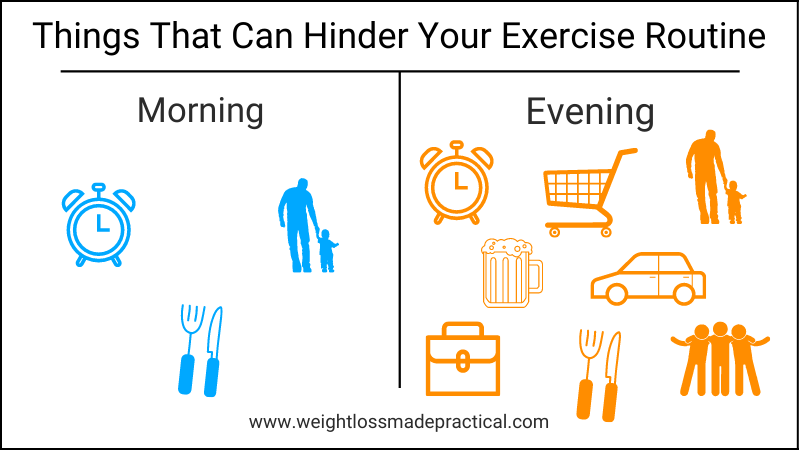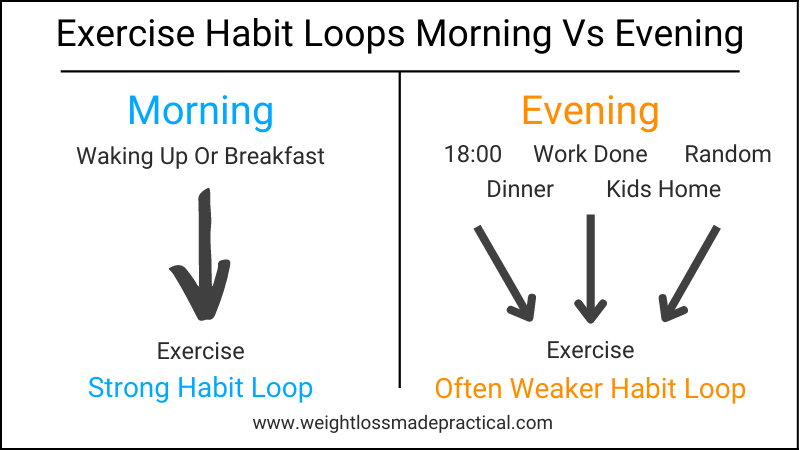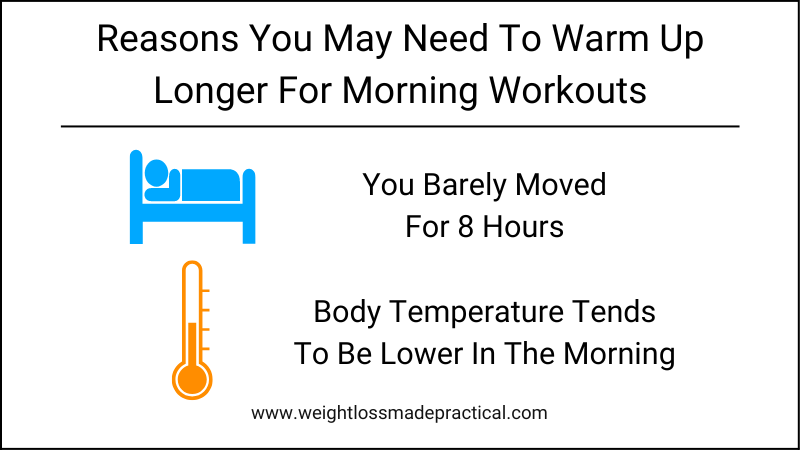Exercise is not only about what you do. When you do it also influences the effects. Find out whether morning or evening workouts would be better for you.
So far, the research looks like the differences in physical effects between morning and evening workouts are not that big.
That means you mostly want to focus on what exercise timing aligns more with your lifestyle and personal preferences.
You can do this by looking at the pros and cons of morning and evening workouts below and potentially trying out both.
6 Pros of morning workouts
While many people could take some time to get used to a workout routine like it, there are definitely some valuable benefits of exercising in the morning.
1. Fewer unexpected events and distractions
The morning is not the most active time of the day for most people. In the case of making exercise a habit, this can actually be a helpful thing.
Your morning routine likely looks like something straightforward like waking up, having breakfast, and potentially bringing your kids to school.
On the flip side, evenings can also involve social gatherings, grocery shopping, unexpected periods of busy traffic, bumping into friends, cooking dinner, working overtime, etc.
Because there are fewer activities, events, and potential distractions in the morning, there are fewer things that can interfere with your exercise habit.

2. Can improve productivity
Basically everyone will know the feeling of having to get in motion at the start of a workday. Morning workouts will likely not completely remove this ritual but they could help you shorten it.
Exercise wakes up your body through changes in hormone levels like cortisol, heart rate, body temperature, etc. Research suggests this can be helpful for productivity.
One study with 67 overweight individuals divided the participants into three groups. The first group sat for 8 hours as a control.
The second group sat for 1 hour, then walked for 30 minutes, and then sat again for 6.5 hours.
Lastly, the third group sat for 1 hour, walked for 30 minutes, and then walked for 3 minutes every 30 minutes of sitting (for 6.5 hours).
They measured that the participants in the groups who walked performed significantly better on cognitive tests than the sitting-only group (1).
3. Can help you get sunlight at an important time of the day
The human body has a variety of circadian rhythms. You can describe these as 24-hour clocks that regulate the release of many important hormones.
Aligning these clocks with your daily rhythms tends to be great for things like your sleep and general health.
One habit that helps with aligning these clocks is getting enough sunlight throughout the day. Especially in the first hour after you wake up (2).
That means morning workouts can be great in the sense that they could save you time by combining two healthy habits.
More specifically, something like going for a run or cycling outside within the hour after you wake up can help you get your morning sunlight and exercise for the day.
Additionally, many people would simply not be able to create the time to get this morning sunlight without a workout.

4. You may have more self-discipline
This next pro of morning workouts does not apply to everyone but many people will find it harder to get themselves to do challenging things after a day of work, tasks, or studying.
While there are many people who enjoy exercising too, humans do have an energy-preservation instinct. In turn, there is typically at least some self-discipline required to get into the habit of working out.
5. Could be easier to create a habit loop
A surprising amount of things you do throughout the day happen on autopilot, through habit loops. These loops are processes you do automatically, without much thought or self-discipline.
If you currently struggle with staying consistent with your exercise routine, you can really benefit from figuring out a habit loop and sticking to it.
Instead of really having to force yourself to exercise every time, it becomes more something you just do without much thought.
Habit loops generally consist of three parts. First, a trigger that starts the action. Next, the action itself. And lastly, a reward for the behavior.
Keeping your triggers and actions in the same loops can be helpful for creating strong habits. This will be easier to do in the morning for two main reasons.
First of all, there are fewer potential triggers before your morning workouts.
Secondly, you have more control over your routine at this time of the day. You can consistently add the workout after certain triggers.

6. Can improve your mood throughout the day
It can be easy to forget but the state of your mood is connected to the physical health of your body and your lifestyle habits.
Besides by improving general health, exercise can also improve your mood by promoting the release of endorphins, so-called feel-good hormones (3, 4, 5).
Something to note is that this benefit definitely also applies to evening workouts.
However, by scheduling your exercise earlier in the day, you may enjoy these positive mood effects consciously for longer instead of going to sleep before your mood has returned to pre-exercise levels.
4 Cons of morning workouts
At the same time, morning workouts still have their disadvantages too.
These cons can help you avoid accidents and/or inform you about whether evening workouts align more with your lifestyle.
1. You could be low on fuel
The human body is able to get the energy to function from a variety of sources. However, depending on your diet and habits, you may be used to some energy sources more than others.
More specifically, people with relatively high-carb diets who eat often tend to be dependent on their glucose and glycogen stores to function well.
It is possible that every once in a while your last few meals happened to be exceptionally low-carb and that your energy stores are running low.
If you have a morning exercise scheduled before breakfast in a situation like that, you could feel really sluggish and low on energy during the workout.
Especially in heavy weight lifting, treadmill sprinting, or other workouts at high intensities.
2. You may need to spend more time warming up
The temperature of the human body tends to be lower in the morning than in the evening (6).
Additionally, after waking up, you have just spent 8 hours not moving at all.
These things make it so you likely need to spend more time warming up in the morning than in the evening.
Since warming up sufficiently can help you avoid injuries and improve performance, this is a detail of morning workouts you definitely want to keep in mind.

3. Less or no group workout classes
Many people really enjoy the motivation, group feeling, and social connections that come with group workout classes.
Unfortunately, these tend to be a lot less common in the morning.
4. Could make your circadian rhythm “anti-social”
As mentioned, your body has 24-hour clocks that regulate processes like when you are most likely to fall asleep and wake up.
Working out in the morning typically requires you to wake up and fall asleep earlier than most people.
By doing this consistently, you move your clocks to a circadian rhythm where you start feeling tired earlier too.
In that sense, working out in the morning can make your circadian rhythm more “anti-social”. You could lack energy in social gatherings that take place later at night.
3 Pros of evening workouts
Evening and late afternoon workouts also have their positive points that make them worth considering.
1. You could perform better
One research review created in 2019 tried to figure out how resistance exercise timing impacts training results by looking at previous studies on the subject.
They concluded that people seem to be able to lift heavier in the evening compared to the morning (7).
At the same time, they also did not find significant differences in strength and muscle size progress between morning and evening workouts.
These are often the main goals people have with resistance training so this is definitely worth noting.
However, you could theorize that resistance training workouts in the evening could be slightly better for weight loss because lifting heavier weights tends to require more energy from your body.
That being said, this last point about weight loss is mostly speculation that needs research.
In short, it currently looks like you could perform better in evening workouts but the differences tend to be small.

2. Can help take your mind off a busy day
Thinking excessively about work even when you are at home can be unpleasant and can be suboptimal for sleep.
If this is something you struggle with, evening workouts could be a great way to take your mind off work.
It is hard to think about anything else when you are doing a HIIT running workout or setting your new personal deadlift record.
3. Could help you get a second breath
Many people feel low on energy after a day of hard work.
This is normal to some extent but many people would prefer to have more energy to make the most of their hours at home.
As mentioned in the pros of morning workouts, exercise can help you feel more energetic by influencing a variety of hormone levels and raising the temperature of your body.
Similarly, by moving this activity to later in the day, you can get more energy in the evening too.
3 Cons of evening workouts
Similar to morning workouts, exercising in the evening does not only include upsides. There are a few potential downsides to keep in mind too.
1. The gym and traffic could be busier
Many people will agree that waking up in time to exercise in the morning can be challenging. The downside of this is that gyms can get relatively crowded in the afternoon and evening.
Additionally, chances are many other people finish work at the same time as you. The road or public transport to your local gym could be congested and slow you down.
The main result of these downsides is that getting to the gym and doing a workout may require more time in the evening than in the morning.

2. Could be more challenging to stay consistent
Due to your social life, unexpected events, and things like working overtime, you may skip your evening workouts more often than in a morning exercise routine.
Since you actually have to do the exercise to get the benefits of a workout routine, being consistent (enough) is important.
3. Could reduce sleep quality and duration
This next potential downside mostly applies to workouts very close to (within 1 hour of) bedtime.
The hormonal and body temperature changes exercise causes are helpful when you want to wake up and become energized. However, they could also reduce your sleep quality and duration (8).
Since sleep quality and duration are so important for things like building muscle, mood, and general health, you preferably don’t want to do your evening workouts too late.
That being said, if you only have time to exercise right before bedtime, it could still be worth doing the workout anyway.
The amazing benefits of working out could potentially outweigh the downsides of somewhat suboptimal sleep.
Keep personal preference in mind
Most of the pros and cons above were lifestyle-focused.
That is because the research on the differences in physical effects between morning and evening workouts is just not that precise yet (or that the differences are not that big) (9).
As a result, the main way to decide between morning and evening workouts is to take the lifestyle pros and cons above into account, potentially try out both, and consider what you find more enjoyable.
Having a workout schedule that you enjoy and fits into your lifestyle helps a lot with consistency and in turn, helps you get the valuable benefits of exercise.
